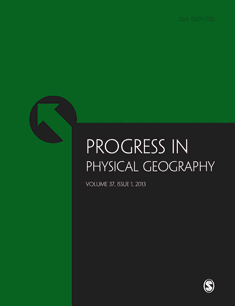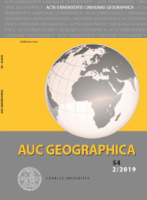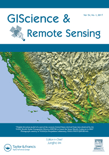
EARTH
Scope & Guideline
Fostering collaboration for a healthier planet.
Introduction
Aims and Scopes
- Earth Observation and Remote Sensing:
The journal consistently publishes research utilizing satellite data and remote sensing techniques to monitor and analyze environmental changes, land use dynamics, and natural disasters. - Climate Change and Environmental Impact Assessment:
A core focus is on understanding the impacts of climate change on ecological, hydrological, and atmospheric processes, alongside assessments of environmental policies and adaptation strategies. - Sustainable Resource Management:
Research addressing sustainable practices in agriculture, water management, and land use planning are prevalent, highlighting the importance of balancing human needs with environmental health. - Geospatial Analysis and Modeling:
The use of Geographic Information Systems (GIS) and spatial modeling techniques is a recurring theme, facilitating the analysis of complex environmental data and decision-making. - Biodiversity and Ecosystem Services:
The journal explores the relationships between biodiversity, ecosystem functions, and services, aiming to inform conservation strategies and sustainable development. - Socio-Economic Dimensions of Environmental Issues:
Studies examining the intersection of socio-economic factors and environmental challenges are emphasized, focusing on the implications for policy and community engagement.
Trending and Emerging
- Machine Learning and AI in Environmental Science:
There is a growing trend in utilizing machine learning and artificial intelligence for predictive modeling and data analysis in environmental studies, indicating a shift towards more data-driven research methodologies. - Interdisciplinary Approaches to Climate Resilience:
Research integrating multiple disciplines—such as social sciences, ecology, and engineering—to address climate resilience is on the rise, reflecting the need for comprehensive solutions to complex environmental problems. - Public Participation and Community Engagement:
Emerging studies are increasingly focusing on the role of public participation and community involvement in environmental decision-making processes, underscoring the importance of local knowledge and stakeholder engagement. - Impact of Urbanization on Environmental Dynamics:
As urban areas expand, there is heightened interest in studying the effects of urbanization on ecosystems, climate, and resource management, with a focus on sustainable urban planning. - Biodiversity Conservation and Ecosystem Restoration:
The journal is seeing increased publications related to biodiversity conservation strategies and ecosystem restoration efforts, driven by global sustainability goals and environmental degradation concerns.
Declining or Waning
- Traditional Geological Studies:
Research focused solely on classical geological studies appears to be less frequent, as the journal shifts towards more integrative and applied environmental science topics. - Single-Factor Environmental Assessments:
There is a noticeable reduction in studies that analyze environmental issues in isolation, with a trend moving towards multi-factorial approaches that consider the complex interplay of various environmental and socio-economic factors. - Historical Environmental Studies:
Papers concentrating exclusively on historical analyses of environmental changes without contemporary relevance are declining, as current and actionable research takes precedence. - Narrowly Defined Regional Studies:
Research that focuses on specific, limited geographic areas without broader implications or comparative analyses is becoming less common, as the journal encourages wider applicability of findings.
Similar Journals

Present Environment and Sustainable Development
Transforming environmental challenges into sustainable solutions.Present Environment and Sustainable Development, published by ALEXANDRU IOAN CUZA UNIVERSITY PRESS, is a prominent open-access journal dedicated to advancing knowledge in the field of environmental science and sustainable development. Since its inception in 2014, the journal has provided a platform for researchers, professionals, and students to disseminate transformative ideas and innovative research aimed at addressing crucial environmental challenges. With its ISSN 1843-5971 and E-ISSN 2284-7820, it emphasizes the necessity of sustainable practices in contemporary society, facilitating interdisciplinary approaches that unite various fields, including ecology, policy, and socio-economic studies. Based in Iasi, Romania, this journal plays a vital role in fostering international collaboration and dialogue on sustainability, making it an essential resource for anyone committed to understanding and improving the environment for future generations.

Quaestiones Geographicae
Unveiling the Dynamics of Our PlanetQuaestiones Geographicae, an esteemed open-access journal published by SCIENDO, serves as a vital platform for scholarly communication in the field of Earth and Planetary Sciences. Since its inception in 1979, the journal has been dedicated to promoting rigorous research and discourse in geography, encompassing a breadth of topics that reflect the dynamic nature of the discipline. With an impressive Impact Factor belonging to the Q3 quartile category, the journal actively contributes to the global scientific community's understanding of geographical phenomena. Its commitment to open-access publishing since 2010 ensures that groundbreaking research is accessible to a wider audience, facilitating collaboration and innovation. As part of its enduring legacy, Quaestiones Geographicae engages researchers, professionals, and students alike, inviting them to explore, share, and expand the boundaries of geographical knowledge.

Earth Interactions
Connecting Disciplines, Unraveling Earth’s MysteriesEarth Interactions is a prominent journal that serves as a critical platform for interdisciplinary research in the field of Earth and Planetary Sciences. Published by the American Meteorological Society, this journal has established itself as a key resource for scholars, researchers, and professionals dedicated to understanding Earth's complex systems and their interactions. With an impressive Q1 ranking in the category of Earth and Planetary Sciences for 2023, it reflects a commitment to high-quality scholarship and impactful contributions to the field. The journal, with its dedicated coverage from 2004 to 2024, encompasses a wide array of topics, providing comprehensive insights into geological, atmospheric, and environmental phenomena. Although it operates under a non-open access model, its significance is underscored by its placement in the top percentile of Scopus rankings (Rank #89/195), making it an exciting resource for those pursuing advanced studies and applications related to Earth's systems.

Progress in Physical Geography-Earth and Environment
Charting new territories in Earth and Planetary Sciences.Progress in Physical Geography-Earth and Environment is a premier academic journal published by SAGE Publications Ltd, renowned for its contributions to the fields of Earth and Planetary Sciences and Geography. With a distinguished history spanning from 1977 to 2024, this journal maintains a robust Q1 classification in both Earth and Planetary Sciences and Geography, Planning and Development, reflecting its high impact and rigorous scholarly standards. As evidenced by its Scopus rankings, it stands at the forefront of research, positioned in the 89th percentile among leading journals. Progress in Physical Geography aims to facilitate the exchange of innovative research, insights, and methodologies, making it an essential resource for researchers, professionals, and students dedicated to understanding and shaping the natural environment. While currently not designated as an Open Access journal, the wide accessibility of its content, combined with its significant impact factor, underscores its importance within the academic community seeking to advance knowledge and application in geography and environmental sciences.

All Earth
Connecting Research and Policy for a Sustainable TomorrowAll Earth is an esteemed open-access journal published by Taylor & Francis Ltd, dedicated to multidisciplinary research in the fields of Earth and Planetary Sciences, Global and Planetary Change, as well as Management, Monitoring, Policy, and Law. Since its inception in 2021, All Earth has swiftly positioned itself in the academic community, achieving notable rankings such as Q2 in Earth and Planetary Sciences and Q3 in related fields, showcasing its commitment to high-quality interdisciplinary scholarship. Researchers and professionals can benefit from its accessible content, which contributes to the ongoing discourse on critical environmental issues and innovative solutions for sustainable development. The journal is based in the United Kingdom and continues to be a vital source of information and inspiration for students and scholars aiming to tackle the pressing challenges of our planet through rigorous scientific inquiry and policy analysis.

Acta Scientiarum Polonorum-Formatio Circumiectus
Empowering research for a greener tomorrow.Acta Scientiarum Polonorum-Formatio Circumiectus is a distinguished open-access journal published by WYDAWNICTWO UNIWERSYTETU ROLNICZEGO HUGONA KOLLATAJA KRAKOWIE, dedicated to advancing knowledge in the fields of ecological modeling, environmental engineering, nature and landscape conservation, and water science and technology. With a commitment to accessibility since its inception in 2006, this journal provides a platform for researchers, professionals, and educators to disseminate their findings to a global audience. Although currently categorized in the Q4 quartile across various ecological disciplines, the journal's aim is to foster critical discussions and innovative approaches to pressing environmental challenges. The journal is based in Poland, and its scope encompasses a wide array of research areas pertinent to contemporary environmental studies. Acta Scientiarum Polonorum serves as an essential resource in its field, encouraging empirical research and theoretical advancements that collectively contribute to sustainable development and environmental stewardship.

Boletim de Ciencias Geodesicas
Innovating the Future of Earth and Planetary SciencesBoletim de Ciências Geodésicas is an esteemed academic journal published by the Universidade Federal do Paraná within its Centro Politécnico. Focused on the dynamic field of Earth and Planetary Sciences, this Open Access journal has been a pivotal resource since 1997, fostering the dissemination of critical research and innovative methodologies. With an impact factor indicative of its relevance in the discipline, Boletim de Ciências Geodésicas ranks in the Q3 quartile for Earth and Planetary Sciences as of 2023, showcasing its commitment to quality scholarship in a competitive field. Researchers and students alike will benefit from access to cutting-edge findings, given its broad scope that encompasses various aspects of geodesy and related sciences. The journal's convergence of research from 2005 to 2024 ensures that it remains at the forefront of emerging trends and fundamental developments in the discipline, further enhancing its esteemed reputation in the academic community.

Visnyk of V N Karazin Kharkiv National University-Series Geology Geography Ecology
Unveiling insights for a sustainable future through rigorous research.Visnyk of V N Karazin Kharkiv National University-Series Geology Geography Ecology is a prominent academic journal dedicated to the fields of geology, geography, and ecology. Published by the esteemed V N Karazin Kharkiv National University, this journal aims to disseminate high-quality research findings and theoretical perspectives that advance understanding in these critical scientific areas. With the ISSN 2410-7360 and E-ISSN 2411-3913, it serves as a vital platform for scholars, researchers, and students striving to contribute to environmental science and sustainable development. The journal promotes open access, ensuring that research is readily accessible to a broad audience, thus facilitating the exchange of knowledge across borders. Its commitment to scholarly excellence makes it an essential resource for anyone engaged in the study of Earth's systems and their interconnections. For additional information and to submit your research, please visit the journal's website.

AUC Geographica
Unlocking New Dimensions in Geography and DevelopmentWelcome to AUC Geographica, a distinguished journal published by CHARLES UNIV PRAGUE, KAROLINUM PRESS, focusing on the expansive and interdisciplinary fields of Earth and Planetary Sciences, as well as Geography, Planning, and Development. With an ISSN of 0300-5402 and an E-ISSN of 2336-1980, this Open Access journal has been freely accessible since 2010, allowing researchers, professionals, and students to engage with high-quality scholarly articles without barriers. As of 2023, it holds a Q4 ranking in its respective categories, reflecting its commitment to contributing to the academic discourse despite competitive landscapes. Located in Prague, Czech Republic, at OVOCNY TRH 3/5, PRAGUE 1 116 36, AUC Geographica aims to foster collaboration and innovative research in the multifaceted relationships between human activities and the natural environment. With a publication history spanning from 1975 to 2024, this journal continues to be a vital resource for those seeking to advance knowledge and explore new dimensions in geography and Earth sciences.

GIScience & Remote Sensing
Transforming Data into Earthly DiscoveriesGIScience & Remote Sensing, published by Taylor & Francis Ltd, stands as a leading journal in the realm of Earth and Planetary Sciences, holding a prestigious Q1 ranking. Since its transition to Open Access in 2022, the journal has significantly broadened its reach, enabling researchers, professionals, and students across the globe to disseminate and access cutting-edge research related to geographic information science and remote sensing technologies. With a focus on publishing high-quality, peer-reviewed articles that contribute to the understanding of the Earth’s processes, environments, and interactions, this journal not only supports advancements in scientific knowledge but also fosters interdisciplinary collaboration. Based in the United Kingdom, GIScience & Remote Sensing continues to pave the way for innovative methodologies and applications, solidifying its vital role within the scientific community.